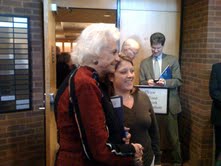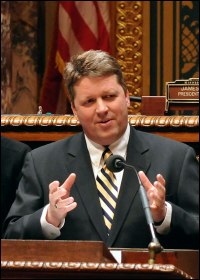Raiding the Piggy Bank
Imagine Junior working and saving for years, pocketing part of the money he earns on his paper route, hoping to squirrel away enough money for a down payment on his college education. That’s a nice story until Dad breaks open the piggy bank to skim off some funds that he says aren’t being used.
The same story is being played out in the Minnesota state budget. Workers forward part of their hard earned pay into dedicated funds only to see the Governor raiding their piggy banks to transfer the money to the General Fund. Last year the Governor proposed eliminating the Health Care Access Fund and transferring all provider tax revenues into the general fund. Why should the Health Care Access Fund serve as a slush fund to pay for projects unrelated to health care or to balance the state’s budget?
This year we learned the Governor’s supplemental Budget was to transfer $267,000 from the snowmobile dedicated account and another $400,000 from the ATV account to the General Fund. Only after organized outrage from these groups did the Governor back down from that proposal.
Electrical contractors are seeing a $1.5 million transfer from the Construction Codes and Licensing Division’s continuing education fund to the General fund. These dollars were paid for by electrical contractors from across the state to offset costs related to education courses, seminars and registration fees for necessary ongoing and required training.
Pick up the daily paper and you will read more of the same. The Star Tribune reported today the Governor’s supplemental budget calls for $1.2 million to be taken from the state’s Water Recreation Account – funds generated by the 860,000 boaters in the form of fee and boat registration – and transferred to the General Fund. Projects that include boat ramps and canoe and boat route management get axed.
More and more of our dedicated funds are not finding their way to their original and intended purpose. Those paying into these various funds are left holding a broken piggy bank with less incentive to continue paying. They are angry and rightfully so. Allowing this practice is a dangerous precedent and will lead to further raiding of our dedicated accounts.

 Question 10. Ronald Reagan appointed the first woman to the Supreme Court in 1981. Name this Associate Justice: A. Ruth Bader Ginsberg B. Madeleine Albright C. Sandra Day O’Connor D. Joan Growe
Question 10. Ronald Reagan appointed the first woman to the Supreme Court in 1981. Name this Associate Justice: A. Ruth Bader Ginsberg B. Madeleine Albright C. Sandra Day O’Connor D. Joan Growe
